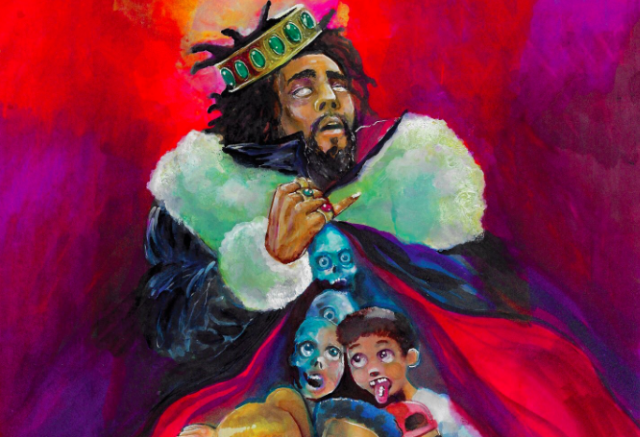By Paul Holtz
The now common ‘Parental Advisory: Explicit Content’ warning is on the front of almost all hip-hop albums but J. Cole has a far more precise disclaimer for his listeners on the cover of his latest record: “This album is in no way intended to glorify addiction.”
KOD – the North Carolina rapper’s fifth studio album – tackles drugs, demons and addiction for the majority of its 12 tracks, with Cole seemingly keen to caution his fans, other rappers and society at large about this set of topics. He’s already delivered three separate definitions for its acronymic title – Kids on Drugs, King Overdosed, Kill Our Demons.
The new album, like his former magnum opus, 2014 Forest Hills Drive, is absent of other artists (save kiLL edward, a mysterious guest whose voice, when sped up, sounds like J. Cole’s), and Cole produced much of it himself. “ATM” and the title track are potent reminders of the way he can rip up a song with his flow alone. Cole is friends with rapper Kendrick Lamar, and KOD, with its bare bones production, snare-drum flows, and focus on greed and pain, seems like a pale shadow of Pulitzer Prize winning DAMN.
On “Photograph,” he plays the new-wave online lover, going after after social media profiles. “Fell in love through photograph, I don’t even know your name/Wonder if you follow back, I hope to see you one day,” he raps in a lustful mumble over a sped-up, bluesy loop. “Love today’s gone digital, and it’s messing with my health.” He talks about being money hungry on the minimalist “Motiv8,” and to public infidelities on “Kevin’s Heart.” “My phone be blowing up/Temptations on my line/I stare at the screen a while before I press decline,” he speaks over an sultry arrangement.
If there’s any optimism in KOD, it’s fleeting but meaningful. “Meditate, don’t medicate,” he riffs in a hypnotic tone over the funky drummer rhythm and muted organ fills of “Friends.” Yet every moment of joy is fraught with complications. While technically an uplifting ending to the album, “Window Pain (Outro)” is riven with sweet-and-sour sentiments: “All I want to do is see my Granny on the other side/All I want to do is kill the man that made my mama cry.” But it has hard hitting lyrics which shows that Cole has been better in specific lyrics rather than the overall rap.
Cole intersperses these moments of relief with riffs on the darkside of being famous – the former “friends” that try to use him for financial gain (“The Cut Off”), the way his swelling tax dollars are used by the government for the wrong reasons (“BRACKETS”). These seem too self centered, making his audience not relate to the feelings or ideas he is preaching about.
The most personal song on KOD is about his mother, Kay, and it combines the emotions and vividity of the album’s standout tracks with the self righteousness of its worst. On “Once an Addict (Interlude),” Cole recalls his mom drinking too much after his stepfather had an affair and child with another woman—going as far to reference the Marvin Gaye songs she was listening to at the moments—as he guilts over his own cold reaction (“Why she always using me for a crutch?”). But while those elements seem to make the song compelling, Cole shows an astonishing lack of empathy for his mother’s pain, even with hindsight, and is ruined by clumsy lines (“Maybe things get better with time, I heard it heals”). Listeners are asked to ponder over the rapper’s pain, rather than his mother’s.

